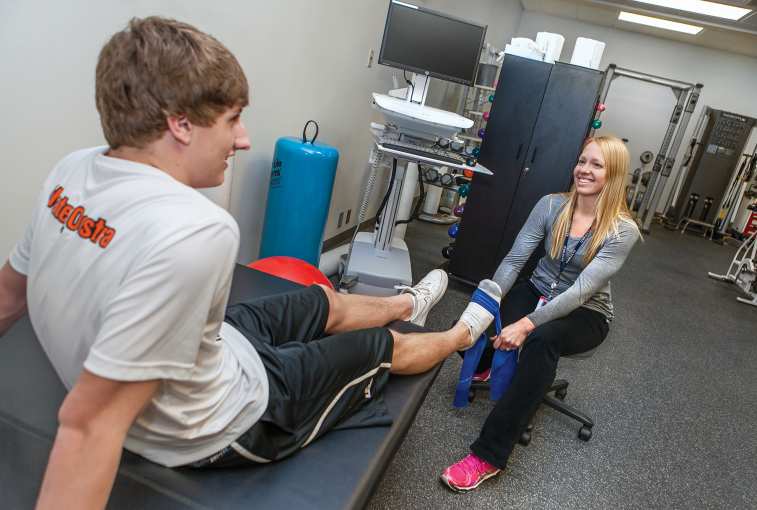When you or a loved one are admitted to Sanford Health’s inpatient rehabilitation, a journey begins toward improved physical or cognitive functioning. Our team of rehabilitation specialists from a variety of fields creates a unique plan of care tailored to your condition, abilities, and expected outcomes. We begin with a discharge plan and work together toward achieving those goals.
Rehabilitation takes focus and determination. It’s hard work, but the rewards of improving your health and functioning are worth it. It’s your job to not give up, it’s our job to not let you give up, while ensuring your safety and monitoring your health condition.
Each patient and family needs support and encouragement during the rehabilitation process. We are here to champion you on, support you and help you achieve your goals every step of the way. We also offer Rehab 101, an informal group discussion led by a rehab professional to educate patients and families on the rehabilitation process, resources and support.
A day in rehabilitation
Below is a typical daily schedule. Please note that this schedule may vary by person, length of stay, physician visits, procedures, tests, etc.
- 7 a.m. — Nursing care
- 7:40 a.m. — Breakfast
- 8:30 a.m. — Occupational therapy
- 9 a.m. — Physical therapy
- 10 a.m. — Speech therapy
- 10:45 a.m. — Occupational therapy
- Noon — Lunch and rest
- 1 p.m. — Physical therapy
- 2 p.m. — Speech therapy
- 2:45 p.m. — Occupational therapy
- 4 p.m. — Psychology or group therapy/ therapeutic recreation
- 5:30 p.m. — Dinner
- 6:30 p.m. — Nursing care, treatments, bathing, family time and education
Looking forward: The discharge process
Rehabilitation begins with a plan for discharge. We focus on setting goals and work together to achieve those goals. When they are met, the discharge process begins. We involved the patient and family in the plan of care at every stage.
A patient is ready for discharge from the rehab program when one of the following occurs:
- Rehab goals and treatment potential has been reached.
- Is medically unstable or a decline in status occurs.
- Rehab functional status reaches a plateau and treatment potential has been reached.
- Elects to leave the rehabilitation unit against medical advice.
- Is unable to participate due to extreme behavioral needs and is referred to special programming.
- No longer requires 3 hours of intense rehab therapy.
Before a patient is discharged, we review medications and home instructions with you and schedule follow up appointments. We also discuss any equipment required for continued progress at home.
Your follow-up care
Transitioning to home requires a coordinated plan and follow up care. We will schedule follow up care with you to ensure you are making progress and have your medical needs met. This care may occur with a rehab physician, therapy provider, specialty clinic or outpatient program. We offer many outpatient services and will work with you to select the appropriate care as close to home as possible.
Patient satisfaction
We regularly evaluate our clinical, financial, workforce, service and operational excellence to ensure that we are providing the highest quality care. We are also accredited by the Commission on Accreditation of Rehabilitation Facilities, which means we meet strict international guidelines for high standards of care.
Your feedback is important to us. We welcome your feedback and suggestions through:
- A survey sent to the patient’s home after discharge.
- A 90-day follow-up phone call after the patient has returned home.
…
Posted In Health Information, Rehabilitation & Therapy
